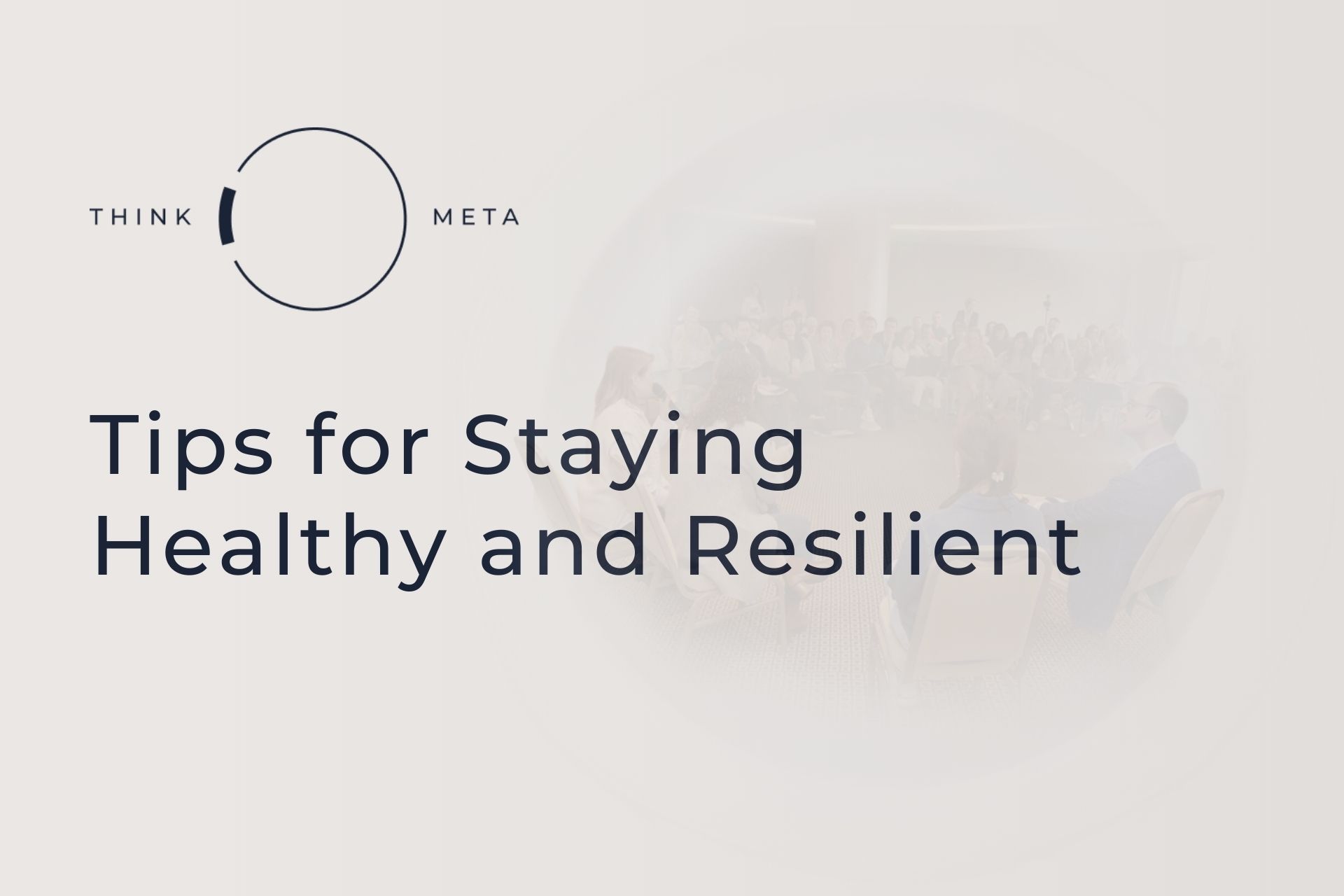Tips for Staying Healthy and Resilient

Mental and physical health are interconnected and greatly contribute to subjective well-being. It is hard to feel happy and content when we are tired, hungry, and dealing with various physical and mental illnesses.
Adopting healthy habits will contribute to your happiness and increase your quality of life. The best part is small but consistent changes give the best results.
Tips for Improving Physical Health
Although most of us know what is good for our health, many lack the will to make healthy choices, often setting unrealistic goals. You probably won't lose 20 kg by June or get a six-pack by August. However, you can create healthy habits that will improve both your physical and mental health by the end of this year.
1. Eat a balanced and nutritious diet.
Many studies show that a nourishing diet will positively impact both physical and mental health. A healthy diet gives you energy and boosts your mood.
2. Engage in regular exercise.
Regular exercise is essential, especially nowadays when we spend too many hours sitting.
Studies (e.g., Kramer, 2020) show that regular exercise can increase both physical and mental health and decrease the risk of certain diseases such as cardiovascular diseases, sarcopenia, osteoporosis, and metabolic syndrome.
3. Prioritize quality sleep and establish a sleep schedule.
Sleep is essential for normal functioning. Numerous studies demonstrate a link between poor sleep and symptoms of physical and mental illness (for details, see Clement-Carbonell et al., 2021).
Additionally, a lack of sleep will result in a lack of energy and impaired cognitive functioning, which might increase the risk of injuries.
If you struggle with setting and maintaining sleep patterns (or if you want to develop healthy habits), check C-flow. C-flow is a short productivity course that takes into account not just efficiency but also creativity, fitness and health, joy, inspiration, and fulfillment. The main idea is that instead of trying to manage time, we should try to manage ourselves by finding balance.
4. Stay hydrated throughout the day.
Water is essential for many biochemical processes in our body. However, most of us do not drink enough water. Even when we do make an effort, it is usually for other reasons (weight loss, better look, etc).
5. Limit alcohol and tobacco consumption.
Numerous studies (for review, see Jiang et al., 2019 ) show that long-term use of alcohol and tobacco increases the risk of developing various types of cancers.
Alcohol and cigarettes are not only bad for your health but also for your wallet. If you cannot completely quit, at least limit consumption. You will certainly feel better.
Tips for Enhancing Mental Health
Many things that are beneficial for our physical health (exercise, healthy diet, good sleep) also improve our mental health. However, there are some additional techniques that are particularly beneficial.
1. Practice mindfulness and meditation.
A great amount of stress and emotional suffering are caused by our anticipation of future events or grieving over our past. Staying focused on the present greatly contributes to our overall happiness.
One way to practice this skill is mindfulness meditation. Numerous studies confirm the positive impact of meditation on our mental health. For example, loving-kindness meditation was associated with decreased symptoms of depression, anxiety, and stress and increased mental health (Totzeck et al., 2020).
Similarly, it was also shown that mantra meditation improved mental health in a non-clinical population (Lynch et al., 2018).
Practicing mindfulness meditation was even shown to be an effective way to minimize the negative consequences of the Covid-19 pandemic by restoring well-being (Matiz et al., 2020).
2. Establish healthy stress-management techniques.
The above-mentioned mindfulness meditation is also an effective way of managing stress. There are also various breathing and grounding techniques. Finally, changing one's life philosophy can also help - in particular, practicing acceptance and kindness.
3. Foster positive thinking and gratitude.
Practicing gratitude is another simple yet highly effective technique for improving mental health and subjective well-being. Many studies (e.g., Emmons & McCullough) show a link between gratitude and positive effects, increased optimism but also more exercise and fewer physical symptoms. Practicing gratitude also increases our willingness to help others.
4. Set realistic goals and break them into manageable steps.
To avoid emotional exhaustion and burnout, it is important to know your limits. Setting realistic goals and breaking them into manageable steps will not just decrease the level of stress but also increase the chance for success. Don't forget to also plan breaks. They are equally important.
5. Seek professional help when needed.
When you feel you need additional support, don't be afraid to ask for it. Many people make mistakes because they wait too long (either because they think their issues are not too serious or because of stigma). As a result, they sometimes spend years in pain. We should take care of our mental health, and there is nothing better than prevention.
Tips for Building Emotional Resilience
Emotional resilience is linked with good mental health. There is also evidence that emotional resilience can be associated with lower cardiovascular risk and mortality (Davis, 2009).
There are some simple strategies you can start practicing today that will build your emotional resilience:
- cultivate emotional intelligence and self-awareness
- create a strong support network
- learn from failure and use it as an opportunity for growth
- focus on what you can control and accept what you can't
- develop problem-solving and coping skills
Tips for Balancing Work and Personal Life
For good health and well-being, it is important to balance our personal and work life.
- Set boundaries between work and personal time.
Ensure that you are not distracted by your personal issues at work and vice versa. Many of us try to multitask, which usually doesn't end well. If you are helping your child with homework while preparing reports, your level of stress will certainly increase, even if you don't make mistakes. Similarly, sending "just one email" during family dinner will make you absent and disconnected.
- Make time for hobbies and leisure activities.
After we fulfill our basic biological and safety needs, we also need to experience joy, a sense of accomplishment, and competence. Find time for your hobbies. You will restore your energy and boost your creativity and well-being.
- Prioritize self-care and relaxation.
Treat yourself the way you would treat your best friend. Self-care is important. Relax and enjoy simple things.
- Cultivate healthy relationships and social connections.
A strong social network is good for our health. Surround yourself with people who inspire you to do things that are good for you.
- Learn to delegate and ask for help when needed.
One of the hardest things for many people is to ask for help. Start with the small things. You will see that others usually gladly help. Helping others makes us feel better about ourselves.
A fulfilling life is the result of continuous efforts and small changes that contribute to your mental and physical health. An ongoing and consistent pursuit of health and resilience, instead of a one-time intervention, will lead to well-being. We gave you some tips, and now it is up to you to use them. If you feel you need additional support for balancing your life and developing healthy habits, check C-flow and unlock your full potential.
Literature
Clement-Carbonell, V., Portilla-Tamarit, I., Rubio-Aparicio, M., & Madrid-Valero, J. J. (2021). Sleep quality, mental and physical health: a differential relationship. International Journal of environmental research and public health, 18(2), 460.
Davis, M. C. (2009). Building emotional resilience to promote health. American Journal of Lifestyle Medicine, 3(1_suppl), 60S-63S.
Emmons, R. A., & Mccullough, M. E. (2003). Counting blessings versus burdens: An experimental investigation of gratitude and subjective well-being in daily life. 84 (2), 377–389.
Jiang, H., Livingston, M., Room, R., Gan, Y., English, D., & Chenhall, R. (2019). Can public health policies on alcohol and tobacco reduce a cancer epidemic? Australia's experience. BMC Medicine, 17(1), 1–14.
Kramer, A. (2020). An overview of the beneficial effects of exercise on health and performance. Physical Exercise for Human Health, pp. 3–22.
Lynch, J., Prihodova, L., Dunne, P. J., Carroll, A., Walsh, C., McMahon, G., & White, B. (2018). Mantra meditation for mental health in the general population: A systematic review. European Journal of Integrative Medicine, pp. 23, 101–108.
Matiz, A., Fabbro, F., Paschetto, A., Cantone, D., Paolone, A. R., & Crescentini, C. (2020). The positive impact of mindfulness meditation on the mental health of female teachers during the COVID-19 outbreak in Italy. International journal of environmental research and public health, 17(18), 6450.
Totzeck, C., Teismann, T., Hofmann, S. G., von Brachel, R., Pflug, V., Wannemüller, A., & Margraf, J. (2020). Loving-kindness meditation promotes mental health in university students. Mindfulness, 11, 1623-1631.

